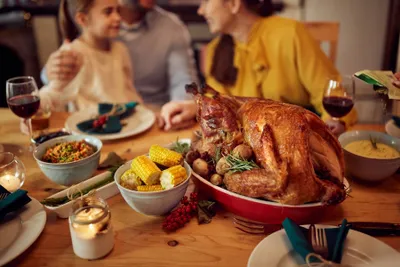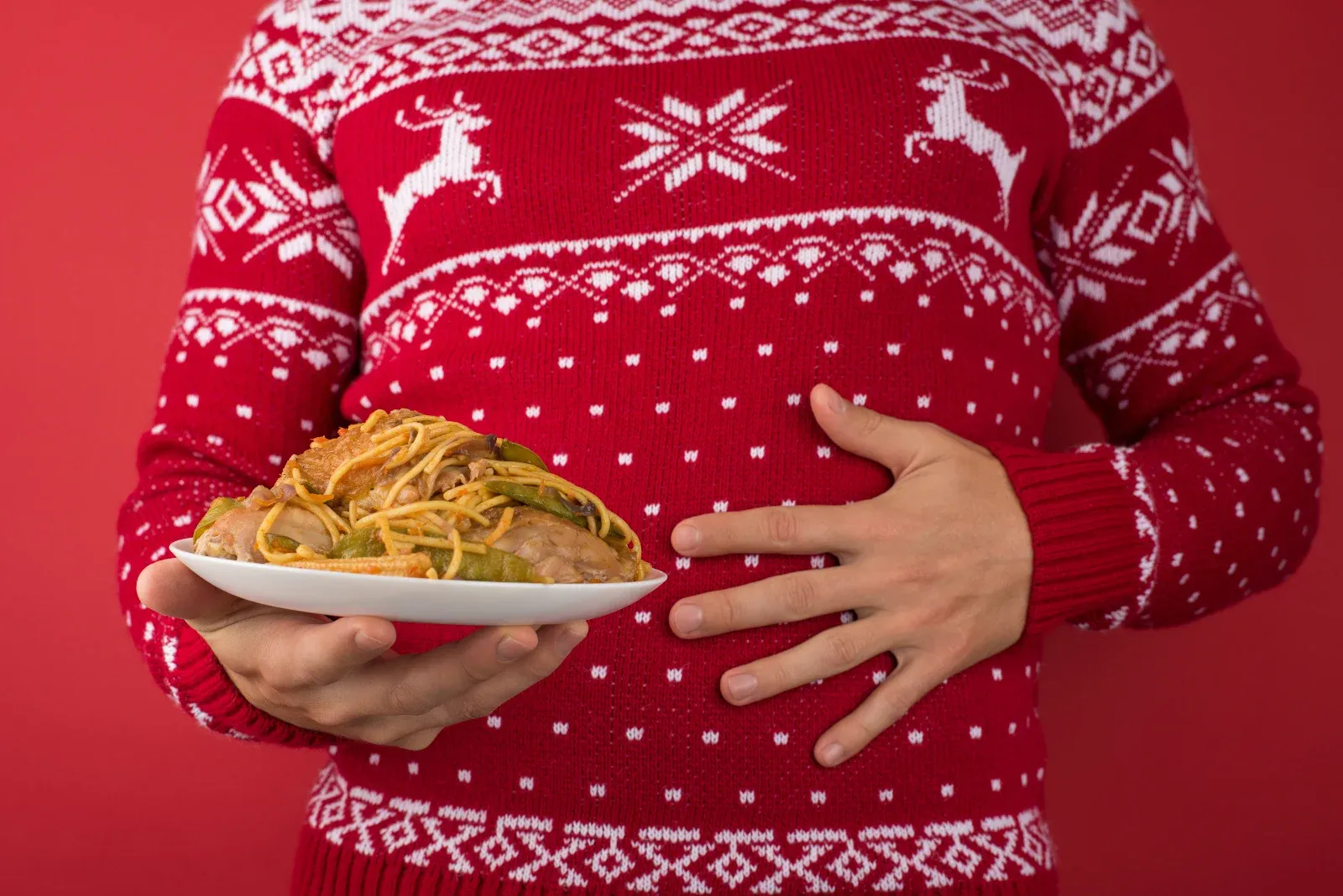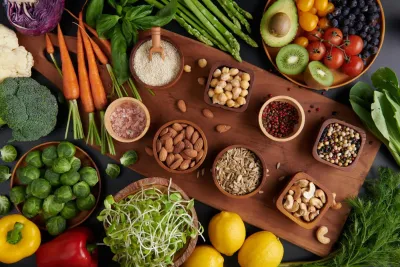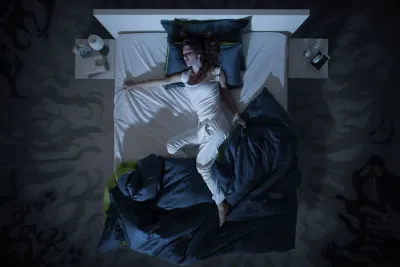
Key Takeaways
Turkey gets blamed for post-meal drowsiness, but the real cause is usually a mix of food choices and holiday habits.
- Turkey contains tryptophan, but it’s not the sole reason people feel sleepy after a big holiday meal.
- Large, heavy meals—especially those high in carbohydrates—are more likely to trigger that classic couch-nap feeling.
- Holiday factors like alcohol intake, extended socializing, and irregular sleep schedules also contribute to sluggishness.
- Post-Thanksgiving sleepiness is usually the result of combined effects from food, drinks, and disrupted routines.
- Staying energized is easier with smaller portions, proper hydration, and a consistent sleep schedule.
For most people, Thanksgiving is a holiday filled with traditions. The extended family arrives, the kitchen becomes a whirlwind of activity, a grand meal is staged, and everyone feasts.
Whether you stay behind to wash the dishes or recline in front of the football game following the big Thanksgiving meal, the inevitable occurs: you start to feel sleepy.
No matter if it’s a long 30-minute nap or an early night to bed, Thanksgiving meal-induced sleep is just another part of the holiday. For years, many people have blamed turkey for making them sleepy.
But does eating turkey really make you sleepy?
Why Does Turkey Make You Tired? The Role of Melatonin Production
If you want a quick answer, here it is: the tryptophan in turkey meat is not what’s causing your post-meal coma. Once you understand what tryptophan is—and the fact that it’s present in plenty of other foods—it’s clear that accusing the turkey is off-base.
What Is Tryptophan?
L-tryptophan (its official name) is an essential amino acid in turkey that makes you sleepy. It’s an amino acid that your body turns into niacin, which is a B vitamin. [1]
Where tryptophan probably got confused with causing sleep is its association with serotonin, a neurotransmitter that’s connected to sleep, and melatonin, aka the “sleep hormone.”
“Turkey breast and other protein-rich foods contain many amino acids, and tryptophan is the scarcest among them, Wurtman says. After a Thanksgiving dinner, several amino acids circulate through the bloodstream.
To get into the brain, they must be shuttled across the blood-brain barrier by specialized transport proteins. Like passengers trying to board a crowded bus, amino acids compete for rides on these transporters.
Note: Holiday favorites like stuffing, mashed potatoes, candied yams, and pie are loaded with carbs that your body quickly breaks down into glucose. That fast spike in blood sugar can leave you feeling sluggish not long after the feast. Be sure to limit your consumption of mashed potatoes and similar foods.
Not only does tryptophan have paltry representation among the passengers, but it also competes with five other amino acids for the same transporter. Placed out by other amino acids, tryptophan thereby has a tough time hitching a ride to the brain.
Taken in isolation, tryptophan would increase brain serotonin, Wurtman says, but no food source contains tryptophan in the absence of other amino acids.
Foods That Contain Tryptophan
Aside from losing in this “competition,” tryptophan is also found in other foods such as:
- Meats, including turkey, chicken, and fish
- Eggs
- Dairy products such as cheese, milk, and yogurt
- Seeds, including sunflower seeds, sesame seeds, and pumpkin seeds
- Soybeans and more.
And since we don’t blame those foods for sleepiness throughout the year, then we can’t blame turkey either—even for that one day on the calendar.
Did You Know: About 3 ounces (oz) of turkey breast contains between 180 and 244 mg of tryptophan. [2]
Cooler Nights, Better Sleep — No Turkey Required
Feeling that post-turkey crash coming on? Don’t blame the bird—blame the heat. Keep your cool and get better sleep with the Chilipad.
What Makes You Sleepy After a Thanksgiving Meal?
While we can dispel the myth that tryptophan causes your sleepiness after a Thanksgiving feast, feeling the need for shut-eye is a real thing.
Here are a few potential culprits making you want to sleep:
Simply Overeating
In that same Scientific American article, [3] biologist H. Craig Heller (Stanford University) states that “Studies have indicated that stretching of the small intestine induces sleepiness and a protein–fat loading of the stomach during a large meal induces sleepiness, and more blood going to the gastrointestinal tract means less going elsewhere.”
In other words, your parasympathetic nervous system begins to recover and conserve energy by decreasing your heart rate and blood pressure to aid digestion.
Tip: To help with overeating, slow down at the table—eat slowly and chew each bite thoroughly so your body has time to signal when it’s full. Also, eating slowly gives your body more time to digest, which can help keep blood sugar from spiking.
According to studies, [4] high-carbohydrate, high-fat meals contribute to post-meal sleepiness, with peak exhaustion occurring an hour to an hour and a half after you finish eating.
Desserts and Carbohydrates
Remember how we noted that tryptophan loses that competition? Well, desserts give it a leg up in the race to the brain. Wrapping up your meal with that piece of pecan pie means your pancreas is secreting insulin, which absorbs other amino acids in your bloodstream—except for tryptophan.
Therefore, this decrease in traffic allows more tryptophan to reach the blood-brain barrier, ultimately releasing melatonin and influencing melatonin production.
Alcohol Consumption
All that food you consume is one thing, but it’s compounded by any wine, beer, or cocktail you’re drinking right along with it, which can affect your digestive system. This can potentially have you catching Zs, whether you’re kicking off the day with a glass of bubbly or finishing it off with a fine scotch.
These sugars can raise blood sugar, rendering you ready for a nap.
Watch the alcohol consumption. After a few drinks, alcohol slows down the brain [5] and depresses your nervous system, causing you to most likely feel sleepy. [6]
If you're curious about how alcohol affects your sleep beyond just making you feel sleepy after a big meal, our blog on the topic for a deeper dive into the science behind it!
Seasonal Affective Disorder
As daylight fades in fall and winter, reduced sunlight can throw off your body’s circadian rhythm and impact your sleep and mood. Seasonal Affective Disorder (SAD), a type of depression triggered by this shift, affects about 3% of people. [7] Common signs include low energy, oversleeping, carb cravings, and losing interest in things you usually enjoy.
Relaxing Atmosphere
The cozy, laid-back vibe of Thanksgiving plays a big role in that post-meal sleepiness. You’re full, comfortable, surrounded by good company, and the room’s warm and calm. Add a soft couch, background chatter, or a football game on TV, and your body naturally shifts into rest mode—it’s not just the turkey making you tired.

How to Avoid the Post-Thanksgiving Food Coma
If you want to avoid falling asleep during the day or disrupting your usual sleep cycle, then timing is everything when it comes to Thanksgiving dinner.
Eat Earlier
Earlier is always better, especially if your meal is around lunchtime. If you're having dinner, try avoiding it too late in the evening. This makes sense when considering that your core temperature dips after lunch. Watching what you consume food- and drink-wise will help, too.
Healthy Snacks Throughout the Day
During the day, if you're hungry, try eating small, healthy snacks. This can help you not overindulge during the main meal. Avoid sugary foods when snacking. Choose healthy nuts and other snacks as sugary foods can make you feel tired and make bad food decisions.
Eat More Slowly
It takes about 20 minutes for your body to realize it's full. So, if you're trying to eat less, take your time and let your body register that it's had enough to eat. Most importantly, stop eating when you are full.
Walk After Dinner
This will give you energy from the carbohydrates and make you feel better than just sitting around half asleep.
However, if you want to enjoy a Thanksgiving nap or turn into bed early, you can always just set your Chilipad Dock Pro bed cooling system low and roll with it. Thanksgiving only comes once a year, so going against your chronotype for this special occasion shouldn't be a big issue for most.
The holidays, in general, with all of the associated gatherings and parties, make it easy to get off your usual schedule. In the end, it's up to you how much you want to allow over-consumption to affect your circadian rhythm.
Final Thought
It’s not really the turkey that’s causing you to feel sleepy after the Thanksgiving meal. While it does contain tryptophan, it's the overall meal— carbs, sides, and maybe a little wine. The combination is more likely responsible for that post-dinner nap.
So, enjoy your turkey breast, savor all the flavors of your holiday meal, and know that post meal drowsiness is completely normal. Whether it’s the food or the atmosphere, go ahead and embrace a little relaxation time. After all, isn’t that part of the holiday tradition?
Frequently Asked Questions About Turkey and Feeling Tired
What Is in Turkey That Makes You Sleepy?
Turkey gets the blame for post-dinner sleepiness, but it’s only part of the story. While it contains tryptophan—an amino acid linked to serotonin and melatonin—it’s no higher than in chicken or beef. The real culprit is the carb-heavy meal that spikes serotonin and makes you drowsy. In short, blame the feast, not just the bird.
Why Do I Always Feel So Tired After Eating Turkey?
It is a perfect storm of factors:
- Eating a large, heavy meal
- Consuming a lot of carbohydrates and sugars
- Alcohol intake
- Relaxing with friends and family
How Much Turkey Do You Need to Eat to Get Sleepy?
While tryptophan is often linked to sleepiness, you’d need around 12 grams of it to feel extremely drowsy. To get that amount from turkey alone, you’d have to eat approximately 8.6 pounds—essentially devouring an entire turkey in one sitting! Now, that's a lot of Thanksgiving turkey!
Which Food Is Highest in Tryptophan?
Tryptophan is found in a variety of nutrient-rich foods, with some of the best sources including:
- turkey
- chicken
- salmon
- eggs
- nuts
- seeds
- tofu
- and cheese
Among these, turkey is often highlighted, but many of these foods are excellent sources of tryptophan, supporting the production of serotonin and melatonin for relaxation and better sleep.
Are There Other Foods That Make You Sleepy Like Turkey?
Yes! Foods like cheese, nuts, eggs, and tofu also contain tryptophan. But again, it is usually the combination of overeating and slowing down that makes you crave a nap—not just one food.
Peer-Reviewed Research References
-
Jenkins, T.A., et al.
Influence of Tryptophan and Serotonin on Mood and Cognition With a Possible Role of the Gut–Brain Axis.
Nutrients, 2016.
Study Type: Scientific Review
Key Finding: Reviews evidence linking dietary tryptophan to serotonin production, mood regulation, cognitive function, and fatigue, highlighting the gut–brain axis as a key mediator.
View Study
Source URL: https://pubmed.ncbi.nlm.nih.gov/26891362/
-
National Institutes of Health (NIH).
Office of Dietary Supplements: Tryptophan.
Source Type: U.S. Government Health Authority
Key Insight: Provides evidence-based information on tryptophan’s role in serotonin production, neurological function, and dietary intake recommendations.
View Resource
Source URL: https://ods.od.nih.gov/
-
Ballantyne, C.
Does Turkey Breast Make You Sleepy?
Scientific American, 2007.
Source Type: Science Journalism (Expert Interview & Research Summary)
Key Insight: Explains why turkey’s tryptophan content alone does not cause drowsiness, and how overall meal composition influences post-meal fatigue.
View Resource
Source URL: https://www.scientificamerican.com/article/fact-or-fiction-does-turkey-make-you-sleepy/
-
Lehrskov, L.L., et al.
The Role of IL-1 in Postprandial Fatigue.
Molecular Metabolism, 2018.
Study Type: Experimental Metabolic Study
Key Finding: Identifies inflammatory signaling—specifically IL-1—as a contributor to post-meal fatigue, linking immune response and energy regulation after eating.
View Study
Source URL: https://pubmed.ncbi.nlm.nih.gov/29753108/
-
MedlinePlus.
Alcohol Intake.
U.S. National Library of Medicine, 2010.
Source Type: Medical Authority Guidance
Key Insight: Outlines how alcohol affects the central nervous system, sleep patterns, and overall health, including increased nighttime awakenings.
View Resource
Source URL: https://medlineplus.gov/alcohol.html
-
Thakkar, M.M., Sharma, R., Sahota, P.
Alcohol Disrupts Sleep Homeostasis.
Alcohol, 2015.
Study Type: Neuroscience Review
Key Finding: Shows that alcohol interferes with sleep regulation, reducing REM sleep, fragmenting sleep cycles, and impairing restorative sleep processes.
View Study
Source URL: https://pubmed.ncbi.nlm.nih.gov/25911195/
-
Ibid.
Source Type: Continuation of Prior Medical Authority Resource
Key Insight: Reinforces guidance on alcohol’s effects on sleep quality, fatigue, and circadian rhythm disruption.
Refers to MedlinePlus (2010), U.S. National Library of Medicine.









